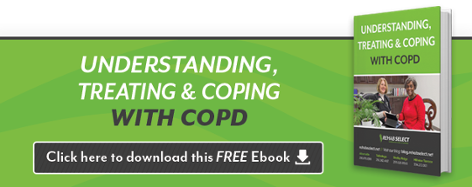 Chronic obstructive pulmonary disease (COPD) is a disease that develops very gradually over a number of years, so slowly that its symptoms often go unrecognized until significant lung damage has already been done. This is unfortunate, since treatment can slow the progression of COPD, delaying its most debilitating effects, and the earlier that treatment begins, the better the results in terms of maintaining adequate lung function and a patient's quality of life. So what are the signs of COPD?
Chronic obstructive pulmonary disease (COPD) is a disease that develops very gradually over a number of years, so slowly that its symptoms often go unrecognized until significant lung damage has already been done. This is unfortunate, since treatment can slow the progression of COPD, delaying its most debilitating effects, and the earlier that treatment begins, the better the results in terms of maintaining adequate lung function and a patient's quality of life. So what are the signs of COPD?
1. Shortness of Breath
Generally this starts out with a feeling of being winded more easily with exercise, a symptom that many simply write off as a sign of getting older or being out of shape. While those things can cause you to get winded more easily, so can the onset of COPD. So how to tell the difference? If you are having trouble taking a deep breath while you exercise, you may have cause for concern, especially if you find that you have begun to avoid exercise due to that type of discomfort. If you experience shortness of breath with activities that you handled without trouble a year ago, or that winded feeling increases with more exertion, it's time to speak to your doctor about getting some lung function tests done.
2. Frequent or Chronic Cough
Getting a cold or cough occasionally is normal for everyone, but if you're getting them more often lately, this can be an early sign of COPD. If those occasional coughs are lasting longer than usual or seem worse, this also can be cause for concern. If coughing has become a daily routine, whether it is a dry, hacking cough or a productive one, it's time to bring these symptoms to the attention of your doctor.
3. Frequent Morning Headaches
A dull, throbbing headache in the mornings when you are just waking up can be a sign of poor lung function if you have them frequently. That's because that sort of headache can come from carbon dioxide buildup, which tends to happen in people with compromised lung function at night, when breathing is naturally more shallow. That buildup causes blood vessels to dilate, including the ones in your brain, leading to that morning headache.
4. Insomnia or Disturbed Sleep
One of the early signs of COPD is trouble getting to sleep or staying asleep, or not feeling well rested after a night of sleep. Sleep problems tend to happen with COPD because the lungs work harder when we're lying down, which can cause discomfort if lung function already is not quite up to snuff. Additionally, people with COPD may have trouble sleeping deeply due to nighttime coughing or sleep apnea – a condition that COPD sufferers are more prone to than the average person.
Other common signs of COPD include edema – or fluid retention and swelling – in the feet and ankles, or a grayish or bluish tint in gums, lips or fingernails. If you notice any of the symptoms mentioned here, getting them checked out as soon as possible is wise. After all, lung damage done by COPD can't be reversed, so if you do have it, you will want to get treatment started quickly– before lung damage gets bad enough to make day-to-day life much more difficult than it has to be.





